(Insert witty one-liner here.)
But, really, the Airbus 380...I mean, yikes:
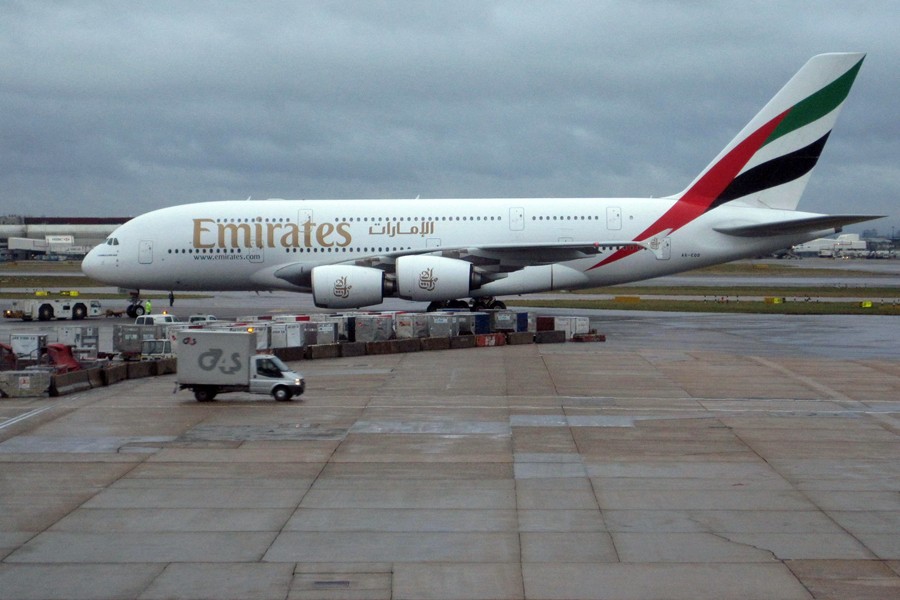
How can you not be impressed?
Parker got to come home from boarding today even though he's going right back there tonight, a canine prisoner furlough for good behavior. Immediately upon returning home he sat in the kitchen and whined as I parceled out his food for his next prison sentence. Poor dude.
The Duke Dividend, a result of not having 20 hours of schoolwork every week, has started to pay off in books. I'm halfway through Ender's Game, after blasting through The Hunger Games trilogy in three days and re-reading Howl again—a new copy I picked up Saturday at City Lights, which I thought appropriate.
When I visit Half Moon Bay, Calif. (which I do about three times a year), I get up several hours before the family because (a) I stay on Chicago time and (b) they sleep later than I do anyway. I usually then walk down California Route 1 for about 1.5 km from the house to the Peet's Coffee so I can work without disturbing anyone.
Since my last visit the city has built a bike trail along the highway, making the trip immeasurably safer and less muddy:
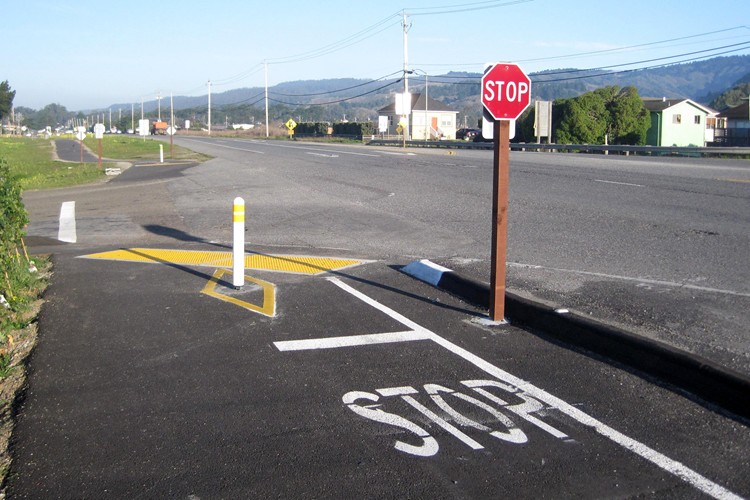
Excellent. They even spent several hundred thousand dollars building this bridge over a drainage ditch:
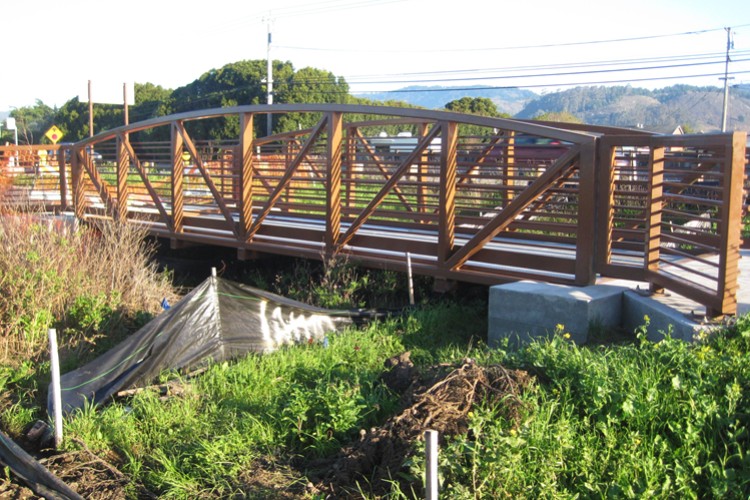
Astute readers will notice something about this photo: either I took it standing in the drainage ditch or on some other bridge over the same ditch. Three guesses which one is true. In fact, the bike trail parallels the frontage road for about 400 m until it gets to this very expensive bridge, prompting even the most-boosterish citizens to ask why the trail doesn't just dump onto the frontage road before getting to the bridge.
Now the punchline: the trail ends 50 m farther up:
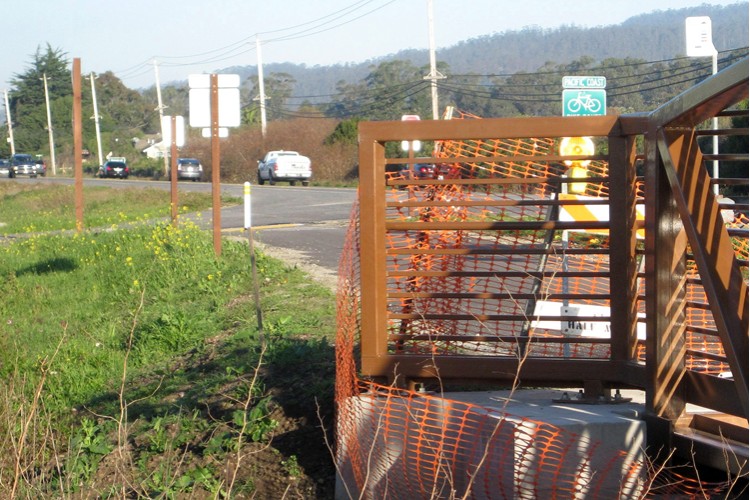
It's a pretty bridge, though. And I suppose it allowed the city to use up the state and Federal grants more completely, and it employed a few dozen Californians for part of the summer. So it's not completely stupid, right?
A trio of crab fishermen had a very bad day earlier this week about a mile from my dad's house:
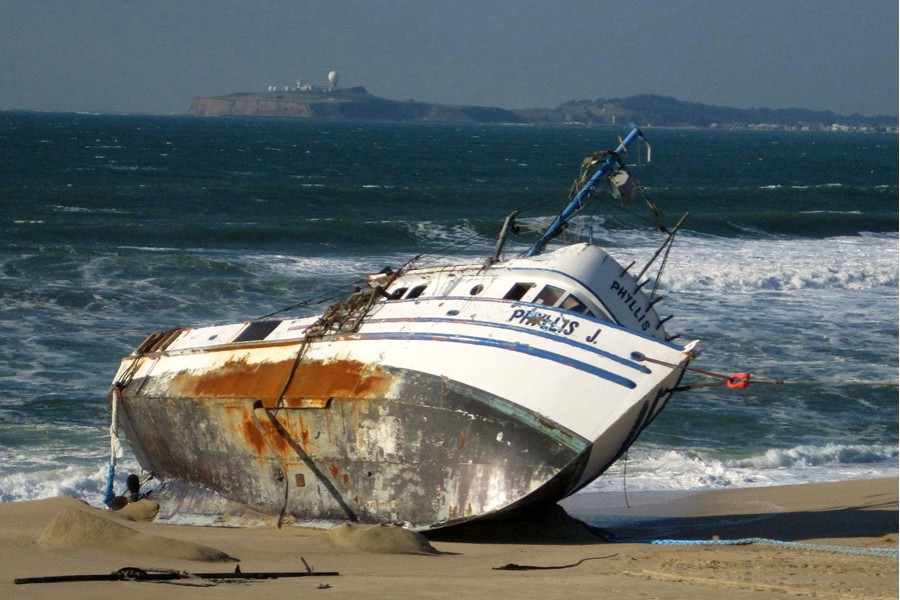
A crab fishing boat flipped on its side in the surf at Francis State Beach early Tuesday morning, sending three crew members scrambling to the beach. All three men were reportedly uninjured.
The incident occurred about 1 a.m. Tuesday. The U.S. Coast Guard dispatched a helicopter and rescue boat from their San Francisco stations and, upon arrival, rescuers found the three crew members clinging to the hull of the listing “Phyllis J.”
Coast Guard Lt. j.g. Laura Williams said the three unidentified crewmen apparently were able to make it to shore on their own and that none of the men required medical attention.
Other reports in the town's printed newspaper suggest owner Larry Fortado and two crew members each thought another man was taking watch as the boat headed to its home dock a few miles away. Right now, local, state, and Federal authorities have to deal with the accident's environmental fallout:
In the past two days, a joint response team of public agencies and private companies were able to avoid a potential oil spill by draining 2,000 gallons of diesel fuel and 500 gallons of residual contaminants from the boat, despite being challenged by blustery winds and tide at its grounded location in the surf zone.
"The plan is to cut the vessel in half, and move the boat up on the beach right next to the bluff," Parker said. "Then a crane at the edge of the bluff will pull it up and get it on a transport to the owner's yard, where he'll weld it back together."
When Dad and I checked out the wreck yesterday afternoon, the salvage crew had started trying to tow the boat farther onto the beach, but the machines couldn't get enough traction.
I imagine Fortado will be crabby for some time.
Oops:
The cause of the communications equipment problem that caused a United Airlines flight out of O'Hare International Airport to make an unscheduled stop in Toronto this week was the pilot's spilled cup of coffee, Canadian officials said.
The flight to Frankfurt, Germany was diverted after the pilot dumped a cup of coffee on the plane's communication's equipment. The unwanted liquid triggered a series of emergency codes, including one for a hijacking, according to Transport Canada, the agency that regulates transportation in Canada.
News reports today have mentioned "communications equipment," but it should be clear that they meant the airplane's transponder. Every airplane flying on an instrument flight plan (which includes every airplane flying above 5,500 m) broadcasts its altitude along with a discrete base-7 code number. The numbers from 7000 to 7777 are reserved for emergencies. So in the pilot's defense, I have to ask why the transponder started sending out 7000-series codes when it got wet. You'd think it would just shut off? And can you imagine the scene at the local TRACON when "United 940 Heavy" started rapidly changing its call sign? What would that look like on the scope?
By the way, the important 7000 codes (7500, 7600, 7700) cause TRACON scopes to go nuts. That would have been exciting to watch, I'm sure.
The Economist's Anthony Gardner didn't mind getting stranded:
Sure, there were dark moments. The first came with the news that our delayed flight from Cairo to Heathrow was being diverted to Brussels; the second, when we learnt that all the airport hotels were full. But thereafter things began to look up. Though it was after midnight by the time Egyptair despatched us to the Hotel Le Plaza in the city centre, its elegant lobby told us that we had landed firmly on our feet.
Brussels—a city I had never previously had a chance to explore—looked magical through a veil of snowflakes. The scene at the Grande Place could not have been more Christmassy: a large, brightly-lit tree; a life-size crib with real sheep; stalls selling Glühwein and waffles. As we feasted on moules et frites in a cosy restaurant with an open fire, our ordeal felt like a holiday at someone else’s expense.
In fairness, one should note that Brussels' city center and Newark's airport have different, ah, characteristics. A year ago I had a 13-hour delay at Heathrow—but I also had an Oyster Card. Never mind my winter coat was in checked baggage; I popped out of the Tube at Piccadilly, bought a warm-enough jacket for £20, and spent the day wandering London.
This demonstrates a problem with most American airports: they aren't near anything. We joke about Newark, but at least from there you can catch a commuter train straight to Penn Station in midtown Manhattan. If you're stuck at LaGuardia or Kennedy, you're really stuck, unless you're happy taking a bus for an hour or taking the A train through some "colorful" parts of New York.
Chicago, Boston, Washington, San Francisco, and to some extent Philadelphia have relatively easy access from the airport to the interesting parts. Stuck at Mid-Continent International? Maybe you find yourself at Hartsfield for a few hours? Enjoy. At least you're not in Denver International, an hour away from the city by car, without any reasonable transit options.
So, sure, Mr Gardner had a delightful time stranded in Brussels. Who wouldn't, in his circumstances? I only hope that my friends who can't get home today and can't leave the airport either manage to stay sane.
Gulliver follows up on the 'sno-good situation at Heathrow:
Gatwick used to be owned by BAA, like Heathrow. But under its new owners, Global Infrastructure Partners, it has coped better than its London rival and is now fully operational. Part of the problem at Heathrow, of course, is that it operates at up to 98% capacity so small problems can have massive knock-on effects. But even so, the differences between snow-fighting provisions at Heathrow and Gatwick are notable, as the BBC has reported:
Earlier this year, BAA published an investment programme of £5.1bn for Heathrow over five years, of which £500,000 was invested in snow and ice-fighting technology this year, with another £3m planned for the next four years. By comparison, reports suggest that Gatwick Airport, which is half the size of Heathrow and was sold by BAA last year, spent £1m on snow and ice this year and plans to spend another £7m next year. Heathrow's "snow fleet" is made up of 69 vehicles; Gatwick's is a reported 150.
It reminds me of a statistic I encountered in 2003, when I worked for a time in Richmond, Va. That year, as many on the East Coast remember, the mid-Atlantic states had 12 snowstorms in three months. I got trapped in DC for two days in February returning from New York; I watched panicked Virginians buy all the bread and milk they could carry upon seeing the first snowflake.
Anyway, it turned out that the Commonwealth of Virginia (area: 110,785 km²) owned the same number of snowplows as the City of Chicago (area: 606 km²). It may be an unfair comparison—after all, municipalities also have snow-removal equipment—but I swear I didn't see Richmond start plowing until the snow had gotten at least 50 mm deep.
And if you want a laugh, the title of this post harks back to this old Monty Python ditty:
Back in 1979, Chicago Mayor Michael Bilandic lost re-election to Jane Byrne mostly for his failure to clear the streets of snow after the worst snowfall in the city's recorded history. His story didn't end too badly, as he ultimately became Chief Justice of Illinois; but it taught all the city's subsequent mayors to get the snowplows out before the first flake hits the ground.
The Spanish company Ferrovial—owner of the British Airports Authority, which runs Heathrow—hasn't, apparently, learned this lesson, according to Daily Beast aviation blogger Clive Irving:
[Y]ou might think that, given its importance, the ability of Heathrow not simply to wreck the holiday travel plans of hundreds of thousands of people but to undermine economies, disrupt international air cargo and, most significantly, to visit disaster on the travel industry, plans would be in place to ensure that it can function after a 13 cm snowfall. After all, terrorists would be delighted to have wrought such harm.
Here we are, though, four days after the weekend shutdown of Heathrow and even now the airport is still barely functional.
And it’s all because the people in charge of Heathrow could not muster the resources to plow two runways and clear ice and snow from terminal gates—not exactly rocket science and something hundreds of airports have to face on a regular basis in winter.
It's interesting how O'Hare manages to keep 7 runways clear (or at least the three in use at any point) during 30 cm snow events, without resorting to the army.
Yesterday, it took me longer to fly home (8½ hours) than it would have taken to drive (6 hours). This almost never happens; and throughout my flight cancellation and delay at Cincinnati's Terminal 2, I remained sanguine and peaceful. (Beer helped.)
Because no matter what flight delays I encountered, no matter what kind of snow blew all over the roads causing the taxi to crawl at a modest walking speed, no matter anything, at least I wasn't in Suburbistan, Ohio:
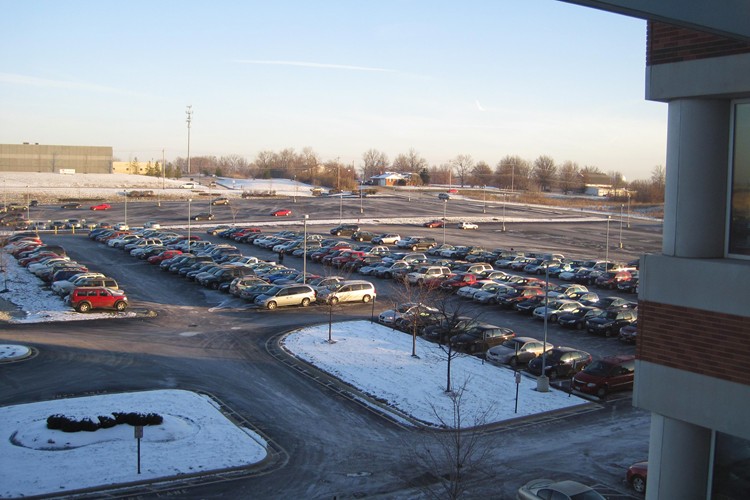
No, my life wasn't that bad anymore.
This was, I think, my last flight of 2010. And for those keeping score at home: this year I flew in or out of O'Hare 43 times. I'm not sure when I'll do that again, either.
Via James Fallows. Simply put, our military occupation of Afghanistan—the police state we've imposed there—has limits on the indignities they'll inflict on the public:
A US Army staff sergeant, now serving in Afghanistan, writes about the new enhanced pat-down procedure from the TSA. Summary of his very powerful message: to avoid giving gross offense to the Afghan public, and to prevent the appearance of an uncontrolled security state, the US military forbids use on Afghan civilians of the very practices the TSA is now making routine for civilian travelers at US airports.
Everything about security involves a balance. "Perfect" security would mean complete controls on freedom, elimination of privacy, etc. Someone who is now exposed to real, daily danger in Afghanistan because of decisions about the proper balance argues that we need to be braver society-wide.
The soldier's note is worth reading.